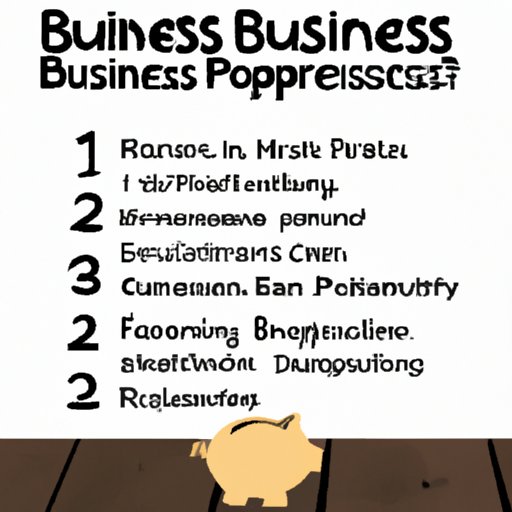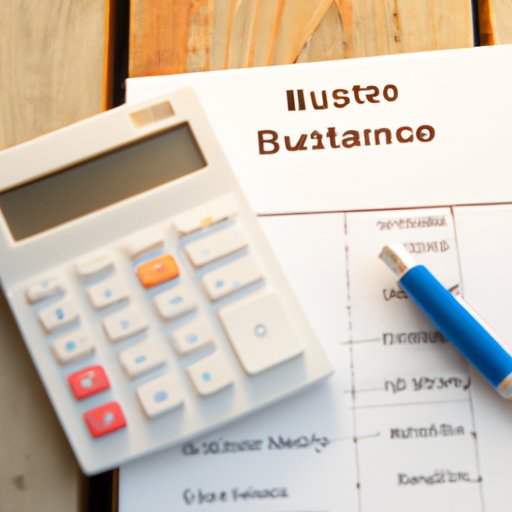Introduction
Starting a small business is an exciting venture. It can be rewarding both financially and emotionally. But before launching your business, it’s important to understand the costs involved. Knowing how much money you need to start a small business can help you avoid common pitfalls and ensure your venture is successful.
Overview of Starting a Small Business
Before you can calculate how much money you need to start a small business, it’s important to understand what goes into launching a business. You will need to invest money in equipment, supplies, marketing and other expenses associated with running a business. Additionally, you may need to hire employees or contractors, create a website, obtain licenses, and secure insurance.

Benefits of Starting a Small Business
Starting a small business has many benefits. It can provide a steady source of income, allow you to work flexible hours, and give you the opportunity to pursue your passion. Additionally, owning a small business can provide tax advantages, such as deductions for business expenses. Finally, you will have the satisfaction of knowing that you are building something that is yours.

Calculating the Startup Costs for a Small Business
Before you can determine how much money you need to start a small business, you must first calculate the startup costs. This involves identifying necessary start-up expenses, estimating variable costs, understanding fixed costs, and considering additional costs.
Identifying Necessary Start-Up Expenses
The first step in calculating startup costs is to identify the necessary expenses. Necessary expenses include items such as rent, utilities, equipment, and supplies. It’s also important to account for any legal fees associated with setting up a business, such as filing fees and taxes.
Estimating Variable Costs
Variable costs are those that change over time, such as inventory and shipping costs. To estimate these costs, consider the types of products or services you plan to offer, the number of customers you expect to have, and the frequency of orders. Additionally, you should factor in the cost of labor if you plan to hire employees.
Understanding Fixed Costs
Fixed costs are those that remain consistent over time, such as rent and insurance. To accurately estimate these costs, research local rental rates, compare insurance policies, and review any contract terms. Additionally, you should consider the cost of licensing and permits, which vary depending on the type of business you are starting.
Considering Additional Costs
In addition to the above costs, there are certain costs associated with starting a business that may not be immediately apparent. These include marketing expenses, such as creating a website, advertising, and creating promotional materials. Additionally, you should consider the cost of professional services, such as accounting and legal advice.
Estimating How Much Capital You Need to Start a Small Business
Once you have calculated the startup costs, you can begin to estimate how much capital you need to start a small business. This involves calculating cash requirements, assessing credit needs, and analyzing your current financial situation.
Calculating Cash Requirements
To calculate how much cash you need to start a small business, add up all the estimated startup costs and subtract any money you already have. This will give you a rough estimate of how much cash you need to launch your business. Be sure to factor in any additional costs, such as inventory and employee wages, that may arise during the first few months of operation.
Assessing Credit Needs
In addition to cash requirements, you may also need to take out a loan or line of credit to finance your small business. To assess your credit needs, look at the total amount of money you need to start your business and determine how much you can pay upfront. You can then use this information to estimate the amount of credit you will need to cover the remaining costs.
Analyzing Current Financial Situation
Before you apply for a loan or line of credit, it’s important to analyze your current financial situation. Consider your credit score, debt-to-income ratio, and other factors that may affect your ability to qualify for financing. Additionally, make sure you understand the terms of any loan or line of credit you are considering.

Determining the Initial Investment Required to Launch a Small Business
Once you have estimated how much capital you need to start a small business, you can begin to determine the initial investment required to launch your business. This involves evaluating sources of funding, utilizing investment opportunities, and considering other sources of capital.
Evaluating Sources of Funding
When determining the initial investment required to launch a small business, it’s important to evaluate potential sources of funding. Consider options such as grants, loans, and angel investors. Additionally, you should research online crowdfunding platforms, which can be a great way to raise funds quickly.
Utilizing Investment Opportunities
In addition to traditional sources of funding, there are various investment opportunities available to entrepreneurs. These include venture capital firms, private equity funds, and public stock offerings. Each of these options has its own set of risks and rewards, so it’s important to research them carefully before making a decision.
Considering Other Sources of Capital
Finally, there are other sources of capital you can consider when launching your small business. For example, you may be able to leverage personal assets, such as real estate or investments, to finance your venture. Additionally, you should explore government programs and tax incentives that may reduce the cost of starting a business.
Exploring Low-Cost Options for Starting a Small Business
In addition to evaluating sources of funding and investment opportunities, there are several low-cost options for launching a small business. These include seeking out grants and loans, leveraging personal assets, and taking advantage of tax benefits.
Seeking Out Grants and Loans
Grants and loans can provide a great source of funding for small businesses. Government agencies, foundations, and banks often provide grants and loans to entrepreneurs. It’s important to research the eligibility requirements and application process for each option before applying.
Leveraging Personal Assets
You may be able to leverage personal assets to fund your small business. This could include liquidating investments, taking out a home equity loan, or borrowing against retirement accounts. However, it’s important to understand the risks associated with each option before making a decision.
Taking Advantage of Tax Benefits
Finally, you should explore tax benefits that may reduce the cost of launching your small business. These include deductions for business expenses, credits for hiring employees, and other incentives. It’s important to research the qualifications for each option before claiming any tax benefits.
Assessing the Financial Requirements of Starting a Small Business
Once you have explored all the available options for starting a small business, you can begin to assess the financial requirements. This involves developing a budget, making an investment plan, and monitoring ongoing costs.
Developing a Budget
Creating a budget is an important part of launching a small business. Your budget should include both fixed and variable expenses, as well as any anticipated costs. Additionally, it should include an emergency fund to cover unexpected expenses. Once you have developed a budget, you can begin to make an investment plan.
Making an Investment Plan
Your investment plan should outline how much money you need to start your business and where you will get it. This includes evaluating sources of funding, exploring investment opportunities, and considering other sources of capital. Additionally, you should consider any tax benefits or incentives that may reduce the cost of launching your business.
Monitoring Ongoing Costs
Finally, it’s important to monitor ongoing costs once your business is up and running. This includes tracking revenue and expenses, managing cash flow, and ensuring you are meeting any obligations. Additionally, you should review your budget periodically to ensure you are staying on track.

Understanding the Cost of Starting a Small Business from Scratch
In addition to the costs associated with launching a small business, there are certain costs associated with starting a business from scratch. These include accounting for start-up fees, estimating operating expenses, and allocating resources.
Accounting for Start-Up Fees
When starting a business from scratch, it’s important to account for start-up fees. These include filing fees, licensing fees, and other costs associated with setting up a business. Additionally, you should factor in any legal or professional fees associated with launching your business.
Estimating Operating Expenses
Next, you should estimate the operating expenses associated with running your business. This includes rent, utilities, payroll, and other expenses related to day-to-day operations. Additionally, you should consider any additional costs, such as inventory or marketing expenses.
Allocating Resources
Finally, it’s important to allocate resources wisely when starting a business from scratch. This includes hiring employees, purchasing equipment, and investing in marketing. Additionally, you should consider the cost of professional services, such as accounting and legal advice.
Conclusion
Starting a small business can be an exciting and rewarding endeavor. However, it’s important to understand the costs associated with launching a business. This involves calculating the startup costs, estimating the capital requirements, determining the initial investment required, exploring low-cost options, assessing the financial requirements, and understanding the cost of starting from scratch. By following these steps, you can ensure your small business is successful.
(Note: Is this article not meeting your expectations? Do you have knowledge or insights to share? Unlock new opportunities and expand your reach by joining our authors team. Click Registration to join us and share your expertise with our readers.)
